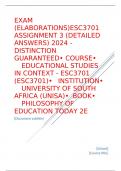EXAM
(ELABORATIONS)ESC3701
ASSIGNMENT 3 (DETAILED
ANSWERS) 2024 -
DISTINCTION
GUARANTEED• COURSE•
EDUCATIONAL STUDIES
IN CONTEXT - ESC3701
(ESC3701)• INSTITUTION•
UNIVERSITY OF SOUTH
AFRICA (UNISA)• BOOK•
PHILOSOPHY OF
EDUCATION TODAY 2E
[Document subtitle]
[School]
[Course title]
, Exam (elaborations)
ESC3701 Assignment 3 (DETAILED ANSWERS) 2024 -
DISTINCTION GUARANTEED
Course
Educational Studies in context - ESC3701 (ESC3701)
Institution
University Of South Africa (Unisa)
Book
Philosophy of Education Today 2e
ESC3701 Assignment 3 (DETAILED ANSWERS) 2024 - DISTINCTION
GUARANTEED Answers, guidelines, workings and references ....................
SECTION A [50 marks]
Hermeneutics and a Hermeneutics Philosophy of Education Write an essay
of not more than 5 typed pages (bibliography excluded) on the following
topic: Hermeneutics Structure your essay as follows: 1. Introduction to the
essay, in which you define hermeneutics and hermeneutics in education.
(10) 2. Body of the essay, in which you discuss the contribution of
hermeneutics theory in terms of the: 2.1 Effect on student–teacher
relationships (15) 2.2 Important role of critical theory in education (15) 3.
Conclusion to the essay, in which you summarise the points discussed in
the essay. No new sources or new information should be introduced in the
conclusion. (5) 4. Bibliography. Below are some references that you should
consult in writing your essay. You may, of course, consult other relevant
sources. Remember that your bibliography must be arranged in
alphabetical order according to author surname. (5) References: • Brauer,
D. 2009. Alternate readings: Student hermeneutics and academic
discourse. Rhetoric Review, 29(1):69–87. • Higgins, C. 2010. Teaching
experience: toward a hermeneutic of teaching and teacher education.
Journal of Philosophy of Education, 44(2/3):435–478. • Maggioni, L. &
Parkinson, M.H. 2008. The role of teachers’ epistemic cognition, epistemic
beliefs, and calibration of success. Educational Psychology Review,
20(4):445–461.
Title: Embracing Hermeneutics: Enhancing Student-Teacher Relationships and
Critical Engagement in Education
1. Introduction
Hermeneutics, derived from the Greek word "hermeneuein," which means interpretation, is a
philosophical approach concerned with understanding and interpreting texts, symbols, and




